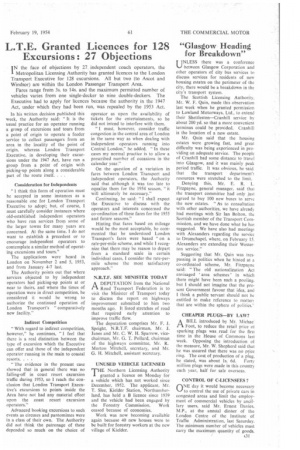L.T.E. Granted Licences for 128 Excursions : 27 Objections
Page 33

If you've noticed an error in this article please click here to report it so we can fix it.
IN the face of objections by 27 independent coach operators, the I Metropolitan Licensing Authority has granted licences to the London Transport Executive for 128 excursions. All but two (to Ascot and Windsor) are within the London Passenger Transport Area.
Fares range from 3s. to 14s. and the maximum permitted number of vehicles varies from one single-decker to nine double-deckers. The Executive had to apply for licences because the authority in the 1947 Act, under which they had been run, was repealed by the 1953 Act.
In his written decision published this week, the Authority said: "It is the usual practice for an operator running a group of excursions and tours from a point of origin to operate a feeder service to collect passengers from an area in the locality of the point of origin, whereas London Transport Executive, in developing their excursions under the 1947 Act, have run a group from a point of origin with picking-up points along a considerable part of the route itself. . . .
Consideration for Independents
"I think this form of operation must be accepted in some instances as a reasonable one for London Transport Executive to adopt; but, of course, I must carefully consider instances where old-established independent operators who have run services from some of the larger towns for many years arc concerned. At the same time, I do not want to establish a precedent or to encourage independent operators to contemplate a similar method of operating excursions and tours."
The applications were heard in London on November 2 and 5, 1953, and from January 4-7 last.
The Authority points out that where services objected to by independent operators had picking-up points at or near to theirs, and where the times of operation were in direct competition, he considered it would be wrong to authorize the continued operation of London Transport's "comparatively new facility."
Indirect Competition " With regard to indirect competition, however," he continues, "1 feel that there is a real distinction between the type of excursion which the Executive can offer and those of the independent operator running in the main to coastal resorts. .
"The evidence in the present case showed that in general there was no falling-off in coast resort excursion traffic during 1953, so I reach the conclusion that London Transport Executive's excursions to points inside the Area have not had any material effect upon the coast resort excursion operators."
Advanced booking excursions to such events as circuses and pantomimes were in a class of their own. The Authority did not think the patronage of these depended so much on the choice of
operator as upon the availability of tickets for the entertainments, so he did not intend to interfere with them.
"I must, however, consider traffic congestion in the central area of London in the same way as when dealing with independent operators running into Central London," he added. " In these cases my normal practice is to allow a prescribed number of occasions in the calendar year."
On the question of a variation in fares between London Transport and independent operators, the Authority said that although it was too late to equalize them for the 1954 season, "it will ultimately be necessary."
Continuing, he said: "I shall expect the Executive to discuss with the operators and interests concerned the co-ordination of these fares for the 1955 and future seasons."
Hinting that fares based on mileage would be the most acceptable, he commented that he understood London Transport's fares were based "on a rate-per-mile scheme, and while I recognize that there may be reason to depart from a standard scale in certain individual cases. I consider the rate-permile scheme the most satisfactory approach."
N.R.T.F. SEE MINISTER TODAY A DEPUTATION from the National r-1 Road Transport Federation is to visit the Minister of Transport today to discuss the report on highways improvement submitted to him two months ago. It listed stretches of road that required early attention to improve traffic flow.
The deputation comprises Mr. F. J. Speight, N.R.T.F. chairman, Mr. J. Janes and Mr. C. W. H. Sparrow, vicechairman, Mr. G. T. Pollard, chairman of the highways committee, Mr. R. Morton Mitchell, secretary, and Mr. G. H. Mitchell, assistant secretary.
UNUSED VEHICLE LICENSED
THE Northern Licensing Authority granted a licence on Monday for a vehicle which has not worked since December, 1952. The applicant, Mr. T. Slee, Kielder Station, Northumberland, has held a B licence since 1939 and the vehicle had been engaged by the Forestry Commission. Work ceased because of economies.
Work was now becoming available again because 40 new houses were to be built for forestry workers at the new village of Kidder.




























































































